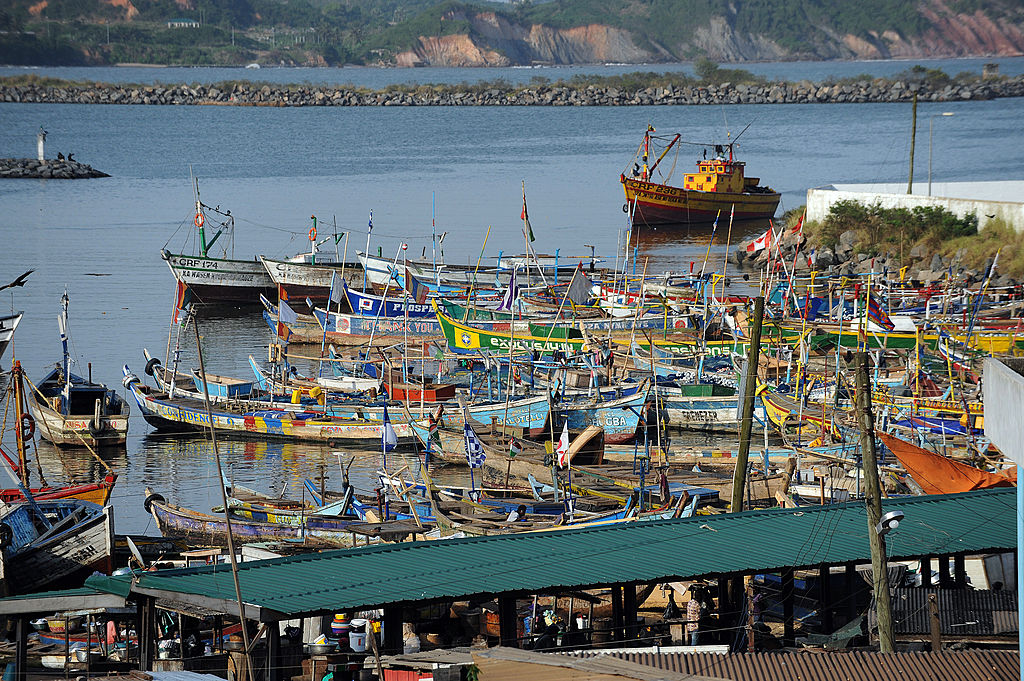Ghana Fights Overfishing to Preserve a Way of Life
ADF STAFF
Fishing was a reliable livelihood in coastal Ghanaian communities such as Apam, Cape Coast and Elmina for centuries.
The waters still bustle with fishing activities, but for years fishermen have returned to shore with gradually smaller catches.
Locals blame the lack of fish on large industrial trawlers, mostly Chinese. For years, the vessels practiced “saiko,” the illegal transshipment of fish at sea. The trawlers typically transfer their massive catch to a large canoe capable of carrying about 450 times more fish than an artisanal fishing canoe. The transfers at sea help trawlers avoid catch limits.
“My family and I are suffering because of the dwindling sea resources,” Cape Coast fisherman Kwabena Taiwa, 17, told The Guardian. “I can’t use light or any of these bad practices. My conscience will not allow me.”
In 2017, the Environmental Justice Foundation (EJF) found that saiko took 100,000 tons of fish from Ghanaian waters, costing the country millions of dollars in revenue and threatening food security and jobs.
According to EJF Founder and CEO Steve Trent, saiko has not resumed at Apam or Elmina, the previous hubs for saiko landings, since the Ghanaian government imposed a closed industrial fishing season in July and August 2021.
While the saiko situation in those areas has improved, the foundation recently found that 90% of the industrial trawler bycatch landed at Tema was below the minimum landing size specified by the government, Trent told ADF in an email. Catching undersized, juvenile fish harms the marine ecosystem.
“These illegal catches are landed openly, in labelled boxes and in full view of the authorities,” Trent said, adding that the catch of juvenile fish is linked to the use of illegal gear.
Chinese trawlers are notorious for using other illegal fishing practices such as bottom trawling, underreporting their catch and using massive lights to lure fish at night.
An investigation by the EJF found that 90% of industrial fishing vessels operating in Ghana are owned by Chinese companies, often through disguised front companies. Ghana loses $50 million a year through opaque arrangements with foreign companies, the foundation found.
The results of overfishing in Ghana have been catastrophic.
More than 100,000 fishermen and 11,000 canoes operate in the country, but average annual income has dropped by as much as 40% per artisanal canoe in the past 15 years, according to the EJF.
Ghana’s small pelagic fish populations, such as sardinella, have dropped 80% in the past two decades. One species, sardinella aurita, is fully collapsed, the foundation reported. Dwindling fish stocks have caused prices to soar and driven food insecurity.
About 20% to 40% of Ghana’s population is food insecure, Richmond Aryeetey, an associate professor at the University of Ghana’s School of Public Health, told Ghana Web.
In Ghana, fish provides 60% of animal protein consumed yearly, according to The Maritime Executive.
More than 200 coastal villages in Ghana rely on fishing as their primary source of income. The nation’s fisheries support more than 2.7 million people — almost 10% of the population.
“Our livelihoods are in trouble,” Ama Mensima, a fish seller on Cape Coast beach, told The Guardian. “Our lives depend on fishing, and it’s getting harder and harder.”
Patrick, a 17-year-old fisherman with little education, foresees a bleak future.
“I could have been in school,” Patrick told The Guardian. “I could have pursued my dreams. Who knows? Now I might have to try to reach Europe.”


Comments are closed.